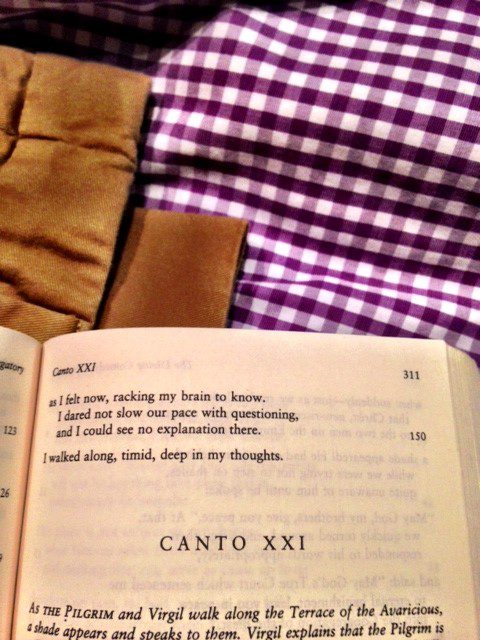Purgatorio, Canto XXI
Rolled in about an hour ago from Wichita, and headed out early in the morning for Pepperdine, in southern California. Above, my Dante laid out on the fresh clothes being packed for Wednesday’s trip. Before I crash, a bit about Canto XXI. I do apologize for the unfocused quality of what follows. It’s been a long day traveling.
This is the canto in which Dante and Virgil meet Statius, a Roman poet of the first century, whose liberation from the terrace of Greed has just been celebrated by an earthquake on the mountain, and a shout of “Glory to God in the highest!” Statius explains to Dante and Virgil what just happened:
Up here the mountain trembles when some soul
feel itself pure enough to stand erect
or start at once to climb — then, come the shout.
The will to rise, alone, proves purity:
once freed, it takes possession of the soul
and wills the soul to change its company.
Remember, the souls of the Greedy are condemned to lie face down in the dirt for the duration of their purging. That’s a powerful image, thinking of a soul rising from its ignominious prostration, because it were no longer a slave to it: the purity of its heart made it a free man. Because it purifies the will, repentance brings resurrection. This morning I was telling an audience of college students how I learned the hard way a lesson that Thomas Merton taught in The Seven Storey Mountain (the title, note, is a reference to Purgatorio): that the intellect may be converted, but as long as the will remains unconverted, the entire conversion is precarious. This lesson cannot be dwelled on enough, I think.
That’s an interesting turn of phrase — “wills the soul to change its company.” It’s another reminder that life is change, and has to be. T.S. Eliot said that Hell, in Dante, is where people cannot change. But so is Paradise. The difference is that in Paradise, they are home; in the Inferno, they are in eternal exile, without hope of home. At Eighth Day Books, I bought a used copy of Harriet Rubin’s Dante In Love, and read a few chapters on the plane home. She powerfully brings home how painful Dante’s exile from Florence was to him, as it would have been to anyone of the Middle Ages, where people were far more powerfully bound, emotionally and psychologically, to their cities. To have been permanently cut off from home was a special torture for a man of Dante’s place and time. Anyway, I’ve been talking for the past day or two about home and stability, and the need for it for the sake of human flourishing — but also how we must live in tension with the requirement never to get settled in our hearts. Life is a pilgrimage that must never end until we are fully united with God. Remember the recent canto in which the Siren, in a dream, tried to convince Dante to settle down with her. It was a trap; had he abandoned his difficult climb, it would have meant spiritual death.
Statius, who was the major Roman poet of his day, does not know he’s speaking to Virgil. He identifies himself to the two travelers, and says that Virgil’s Aeneid was the “sacred flame” that sparked his own art; he calls the Aeneid “the mother of my poetry.” This prompts a truly funny moment in the Commedia: Dante breaking out into tears and laughter when he realizes that poor Statius has no idea who is standing in front of him. Dante has to spill the beans, which makes Statius fall at Virgil’s feet worshipfully.
But Virgil: “Brother, no!
You are a shade; it is a shade you see.”
And Statius, rising: “Now you understand
how much my love for you burns deep in me,
when I forget about our emptiness
and deal with shadows as with solid things”
I read this as Virgil insisting on the egalitarian state that everyone in Purgatory lives in, but Giuseppe Mazzotta says that Virgil is actually making a point about the distance between poets and their poetry. He’s chastising Statius, in a friendly way, not to think that he, Virgil, is particularly special because he wrote the great poem that sparked his (Statius’s) own vocation to poetry. This is a surprising point coming from Dante, who hero-worships Virgil, and also considers him to be his inspiration. What’s going on here? We are going to learn more about it in the next canto.
On to L.A. in the morning. Coming to see you, Pepperdine!


Subscribe for as little as $5/mo to start commenting on Rod’s blog.